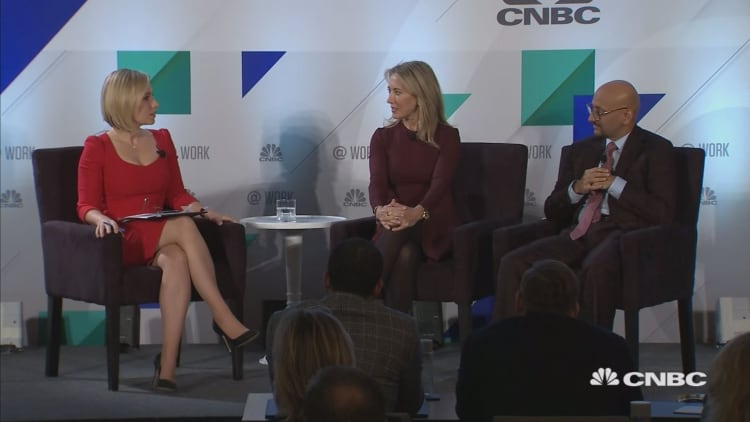In the era of open-office floor plans designed to increase collaboration at the expense of privacy, more workers are finding a new space for isolation — headphones.
Such is the case with Christopher Reichert, android software developer at OfferUp, a company that has fully adapted the open-concept workspace. "I listen to music on my headphones because it helps me drown out noise and distractions in the office," said Reichert.
"While I like working in an open-office environment because it make spontaneous collaboration easier, more distractions can happen both because of noise and because it's easier for people to start conversations and pull you away from what you're trying to focus on," he said.
Experts say that contrary to concerns about fostering a team environment, listening to music at work may make workers more productive.
A study conducted by the staffing firm Accountemps, a subsidiary of global human resources firm Robert Half, found that an increasing number of professionals like listening to music at work and are actually more productive when they do so. The company polled more than 1,000 workers in an office environment and found that 85% like listening to music. In particular, the study found that 71% of professionals say they feel more productive when listening to music.
The mental link between music and productivity
Spotify found that 61% of people report listening to music at work to boost their productivity and happiness. Cloud Cover Music found that 78% of people believe listening to music at work makes them more productive.
All this increase in productivity, however, may have little to do with the music itself.
"There's a whole body of psychological research that looks at just feeling mildly content, called State Positive Affect, and there's a link between being in that content state and being better at creative problem-solving," said Teresa Lesiuk, director of music therapy at the University of Miami. "Because music experiences generally tend to be positive and bring about positive moods, a person can end up more productive," she said.
Lesiuk collected data from employees' actual work environments over a five-week period. Out of those five weeks, participants were given three "music listening" weeks. What Lesiuk found was that State Positive Affect, or feeling content, increased from pre- to post-listening in each of the three music listening weeks, and quality-of-work was lowest during the "no music" listening period.
Additionally, the participants in her study could listen to music of their own choosing — either from their own collections or from the music library Lesiuk provided.

"It's a general foundational principle to music therapy that a person's preferred music is the music that has the most meaning and influence on them. As a result, people can be productive to all sorts of genres including classical music, hard rock, and even Russian pop," Lesiuk said.
Spotify currently has more than 35 playlists under their "Focus" genre, including one called "Productive Morning" with over 400,000 followers and another called "Your Office Stereo" with over 150,000 followers. Spotify's "Productive Morning" uses calming, post-rock instrumentals, while "Your Office Stereo" consists of various indie and alternative selections, such as Papillon by Voyou and Darjeeling by Barrie.
"Our company doesn't have any hard and fast rules on playing music in the office, but because one of our core values is to be neighborly, we don't encourage people to play music on speakers unless you can make sure it doesn't carry into your co-workers' workspaces," said Natalie Angelillo, vice president of community at OfferUp. "A lot of employees wear headphones to help them focus, which we absolutely encourage because music can be a great motivator at work."
Negatives to consider
Wearing headphones at work has a negative side, especially when it comes to how the action is perceived. The Robert Half survey revealed that wearing earbuds or headphones caused resentment among co-workers and was seen as "a major office-etiquette problem."
Headphone use in the office predates the boom in streaming media like Spotify and Apple Music, and executives have long expressed concerns.
One of the biggest problems of headphones in the office is the loss of spontaneous creativity, exchange of ideas and common purpose that comes with having natural free-flowing conversations, Anne Kreamer, former executive vice president and worldwide creative director for Nickelodeon and Nick at Nite, wrote in the Harvard Business Review piece back in 2012.
But she noted that "headphones can operate as a visual 'do not disturb, I'm working' signal for employees who, in open-plan offices, need solitude in order to execute their work. ... Being able to achieve that sense of solitude when necessary is clearly important."
But she added, "Organizations need to develop protocols that avoid making isolation the universal default office norm, and that encourage face-to-face interaction."
Only 9 percent of workers surveyed by Accountemps-Robert Half said their office did not allow music. Forty-four percent said their employer allowed music with no restrictions (e.g., mandating use of headphones).
As the open office concept has been widely embraced and more workers keep the wireless earbuds on as part of their everyday wardrobe, finding the right balance is key.
"I have worked at several places with private offices and a few with open offices. More personal space in an office and being able to close the door can help, but these nice-to-have attributes of a personal office are completely overshadowed by the benefits to the team of open space," said Jeff MacDuff, director of engineering at OfferUp.
"The team interaction, the frequency of spontaneous discussions both social and technical, and the team building aspect deliver more to the individual and the business than personal offices do. Building world-class software is a team sport, and the best teams are built via open space, not closed doors," he said.
Music is part of that equation.
"We encourage everyone to bring their authentic selves to work, and because music can play a big part in our lives, we support bringing it into the office, as long as it doesn't disrupt the workflows around them," offerUp's Angelillo said.
—Caroline Gao, special to CNBC.com





